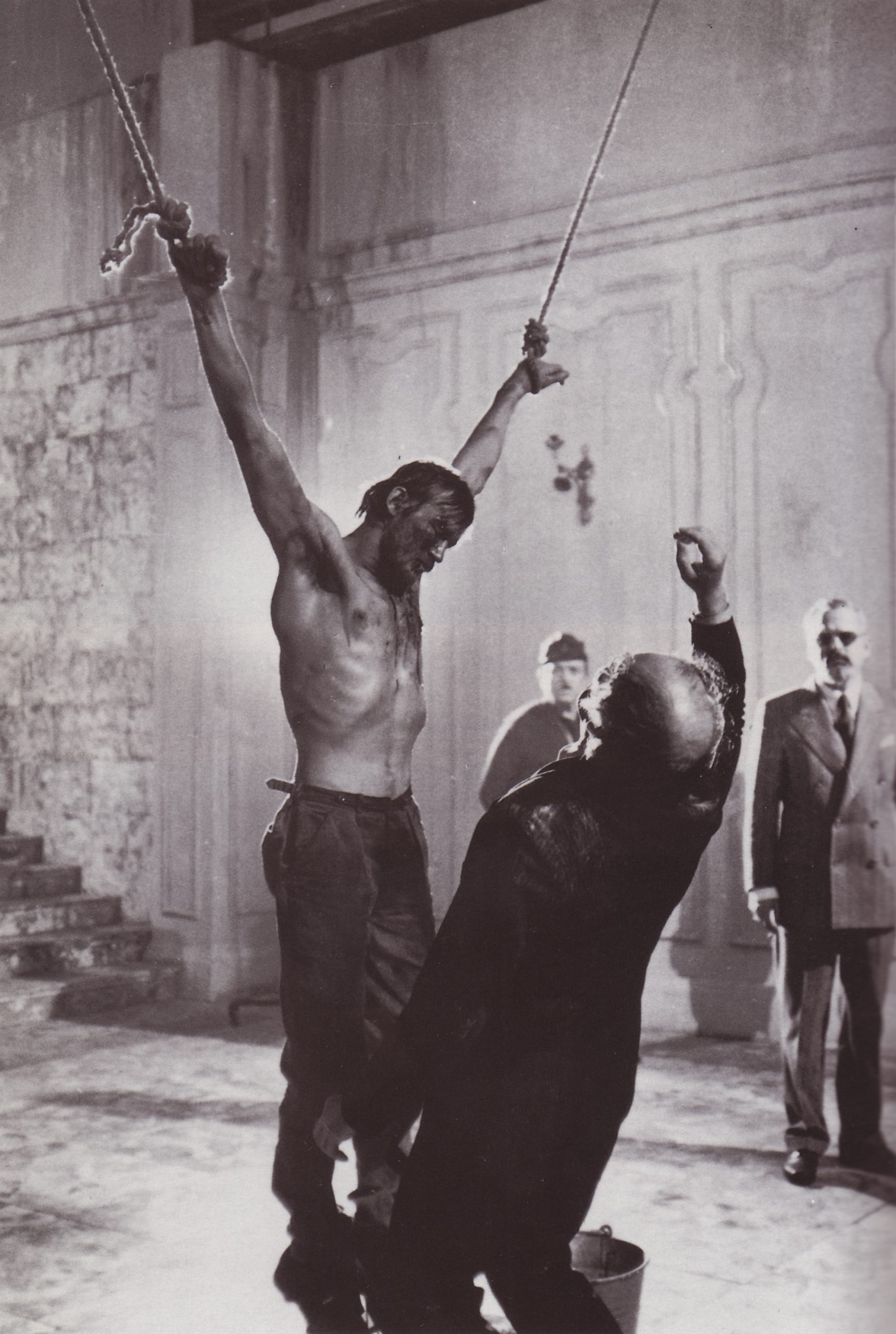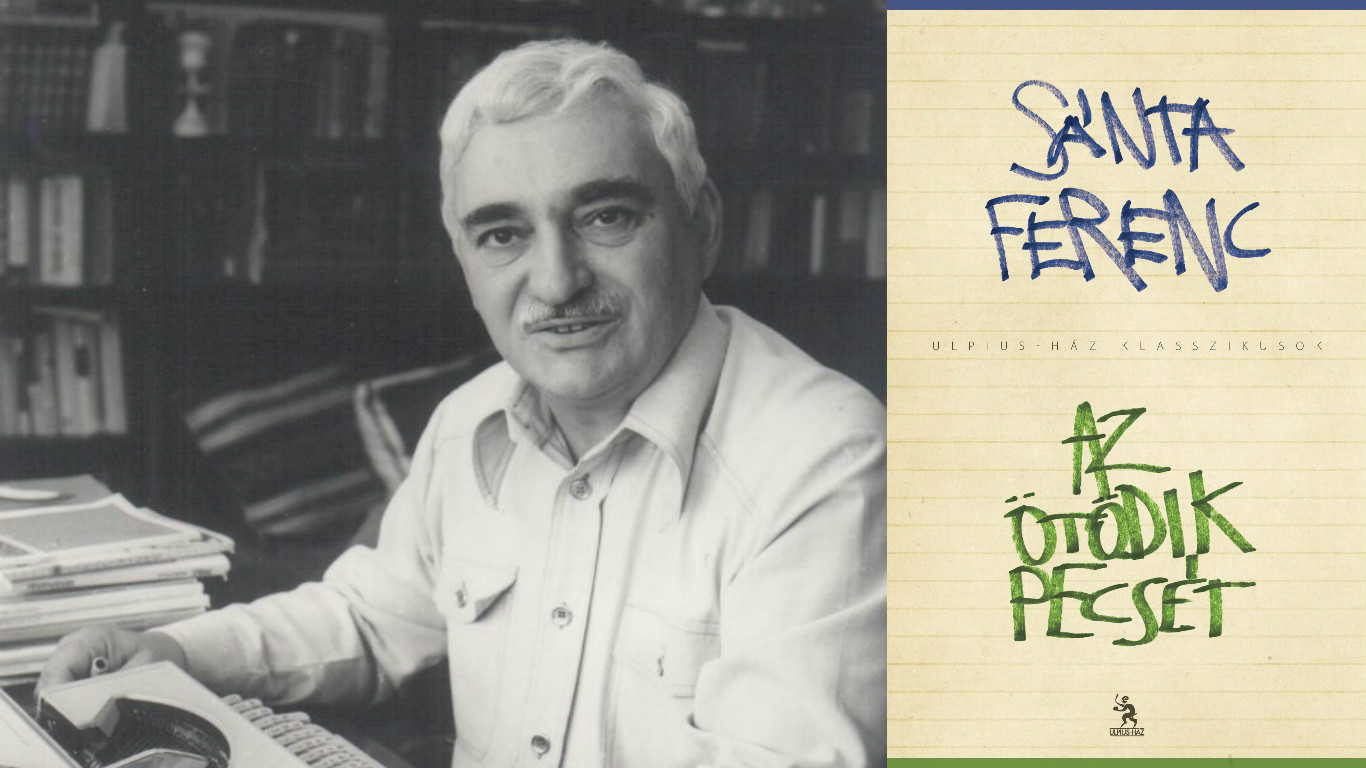by Bryan Burns
Fábri has always been drawn to moral anguish, and nowhere more so than in The Fifth Seal. The film is set in Budapest towards the end of the Second World War. Four middle-aged men, conspicuously ordinary and everyday, meet up to drink at an inn, as they seem to do most evenings. They are Gyuricza, a provocative, Mephistophelean watchmaker and something of a dandy, played by Lajos Őze; the decent, serious-minded joiner, Kovacs; Király, a self-indulgent and querulous book salesman; and the innkeeper himself, the pugilistic, red-faced Béla. Their conversation is anecdotal and frivolous, but it is shadowed by the scenes of torment from the paintings of Bosch with which it is intercut, and by sounds of gunfire heard outside the door. The group is joined by a haggard “artistic” photographer, Keszei, after which their talk takes a graver turn. Gyuricza tells a story of two men, the first a slave whom the most terrible calamities befall but whose conscience is clear, and the second a tyrant entirely untroubled by the atrocities he commits. He asks his friends which of these men they would choose to be, if they could be reborn. At this point, two members of the Nyilaskereszt (Arrow Cross), the Hungarian Fascist organisation, briefly intrude in search of a drink. The group expresses scorn for these interlopers, and then returns to a fascinated discussion of the problems raised by Gyuricza’s fable. Still considering their responses, the men separate, each returning to his wife or mistress, except Gyuricza, who shares his home with a number of Jewish children he is hiding from deportation and certain death.
The following night, the friends again congregate at the inn and resume their debate as to what constitutes a righteous life. But a posse of Arrow Cross men, led by a sinister young blond officer, bursts in and without explanation carries the men off to an interrogation centre. The commandant of the centre is a man of sophistication and ruthlessness, suavely played by Zoltán Latinovits. We discover that Gyuricza and his companions have been betrayed by Keszei; they are thoroughly beaten, so that they will never again feel free to criticise those in power over them. But they are not quite broken, so the commandant parades them melodramatically before a tortured, Christ-like young partisan (György Cserhalmi), and promises each of them his freedom if he will only strike this man twice. Kovács faints in the attempt, and is dragged off; Béla unexpectedly attacks the Arrow Cross officers and is shot; Király is knocked unconscious; only Gyuricza, livid with horror, can bring himself to perform the deed. He is set free, and at the end of the film we watch him slowly shuffle through the empty streets of the city.
Although drawn from a novel by Ferenc Sánta, The Fifth Seal resembles a play more than anything else. It has three acts, corresponding to the protagonists’ first night at the inn, the interlude at their homes, and the second night they spend partly at the inn and partly at the Arrow Cross headquarters. It is a work of enclosed spaces, apart from Gyuricza’s last, stumbling progress towards his apartment; there is little movement, almost all the narrative of the film being conveyed in talk, not in action. Even the little world of the inn, lit with interrogative brightness by György Illés but with deep shadow all around, and from time to time ironically cheered by the music from a mechanical organ, has a perfect theatrical appropriateness. The Fifth Seal does not escape from the dangers of wordiness and claustrophobia incumbent on the mode Fábri has chosen for it, but it is also concentrated and intense. From the start, we perceive that it is to be a work of metaphor and generality rather than a depiction of a particular reality. From the commandant, with the dark glasses essential to a role of this kind, through the earthy Béla, the sensual Király, and the grave, upright Kovács, to the teasing, morally reconnoitring Gyuricza – each of the characters has an evident thematic function. During the first act of the film, we note the self-indulgence and thoughtlessness of the group, rejoicing in their drinks and cigarettes and abstract discussions as the tragedies of war are played out unheeded around them; later, we see reality force itself punitively upon them, as Gyuricza’s story takes flesh thanks to the devilish imagination of the Arrow Cross commandant. The Fifth Seal offers a warning that we should not disregard the dilemmas of the actual world and of history, and that we must be prepared to live and to choose righteously. But its conclusions are not simple. Béla, Király and Kovács prove themselves men of principle and perhaps true Christians, although also in some sense incapable. Only Gyurica, borne up by the thought of his Jewish dependents, is sufficiently strong to make the necessary compromise, and so to survive for the general good. As the film ends, therefore, we are left with a genuinely heightened sense of the sickening difficulties of choice, especially during wartime.
Source: World Cinema 5 – Hungary, pp.43-45


